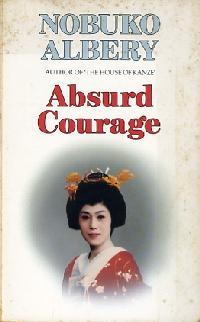Absurd Courage
From here to maternity
By William Wetherall
A version of this article appeared as
"From here to maternity" in
Mainichi Daily News, 21 November 1988, page 9

Nobuko Albery This book is perhaps less a novel than a soap opera put to print. No theory of literature need mar the reader's enjoyment, and pleasurable this story is if you like fast, bouncy telling and if you keep your umbrella out for the heroine's leaky lacrimal glands. The teary tedium of this woman-makes-best-of-marriage melodrama is partly relieved by the author's bubbly sense of humor. Two of Nobuko Albery's three novels have been inspired by personal experience. Her first, Balloon Top (1978), is about a Japanese woman who was born at the start of the war, began school in the occupation and became an adult in college during the '60s. She writes better if not more personally, however, in her most recent novel, Absurd Courage, about "a perfectly ordinary Japanese girl" who "shared a taxi with a foreigner" and survived. Albery, educated in Japan before continuing her studies at New York University in 1960, received a degree in drama and became the U.S. and European representative for the Toho film theater company. She dedicated Balloon Top to her husband, the late Sir Donald Albery; The House of Kanze (1985), which attempts to use historical fiction to reveal the life of the noh dramatist, actor and critic Zeami, to Dame Ninette de Valois and Dame Margot Fonteyn; and Absurd Courage to her late mother-in-law, Lady Albery. Such facts reinforce the impression that Albery has witnessed the world she portrays in Absurd Courage. She has no difficulty breathing life into Asako Katagiri, about her own age, and from her own neck of the Osaka-Kobe woods. Tristram Harder, the foreigner Asako shares a taxi with on a rainy night in Tokyo, comes with equal ease, except in bed, where Asako has a harder time getting pregnant. Asako is not a gaijin groupie, but just like one, she leaps at the chance to marry Tristram, "my darling pompous silly ass Ph.D., D.Litt.," a British art critic who lives in London. Tristram views marriage as something between himself and Asako. He is unconcerned about her family and cares less what they may think of him. And she is not to worry about his parents, though in fact he expects her to regard his life as hers, and she has no choice but to learn to get along with his people and pass their social tests. Vignettes of the marriage bed are the story's comic highlights, but Tristram's low sperm count leaves Asako barren after four years of trial. Asako bursts into tears every time her best friend calls to boast about a pregnancy or birth. Tristram adores Asako, though, and genuinely wants their fruitless marriage to last forever. Asako finally declares: "Tristram, I will have a baby and we'll be cozy and calm and very together." That night, in bed, she tells him: "I'll spare you the unappetizing clinical details on the way. I'll tell you only when I am pregnant." There is no explicit consideration of artificial insemination. Though this may seem unrealistic, it seems to be in keeping with both Asako's and Tristram's characters. Tristram is resigned to the prospects of surrogate fatherhood as the price he must pay for his infertility. Asako has no clear plan. One day she simply avails herself of an opportunity to indulge a long-held fantasy about her best friend's strange husband, a British lord cum counter-culture caricature of Yukio Mishima, who offers to give her the baby she wants. Asako's lover leaves her so impassioned that, for the first time in her marriage she seduces Tristram, who mutters: "Oh dear, darling, what does this mean?" For him, her announcement that she is pregnant means that he is to be a father, and only she and the reader are left to wonder about paternity. The fairy tale ends with this spiritual message from Albery's alter ego: "What I know today, I will not tell my own daughter. I want her to plunge if she must with all her absurd courage intact. The rest will follow, for worse, for better." Having the courage to plunge is one thing; having a purpose in plunging is another. But Asako, as created by Albery, seems to be plunging for the sake of having nothing more rational to do. The tour guide that lives in the heart of most tellers of stories set in Japan and spoiled Balloon Top is not as evident in Absurd Courage, which has only one footnote. Among other recently published expatriate Japanese or former Japanese writers, Albery attempts but does not quite reach the novelistic depths which the naturalized British author Kazuo Ishiguro fathoms in both A Pale View of Hills (1982) and An Artist of the Floating World (1986). But Albery is both a better storyteller and stylist than Hisako Matsubara, whose Samurai (1980) and Cranes at Dusk (1985) are English translations of German originals. |